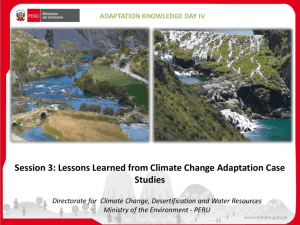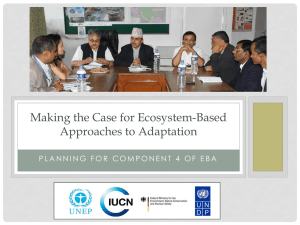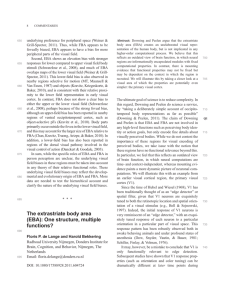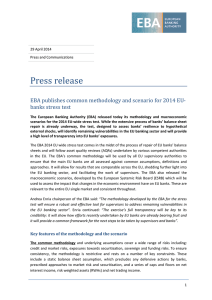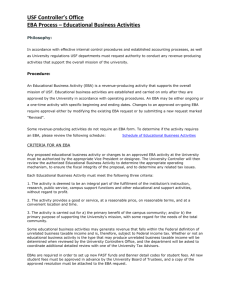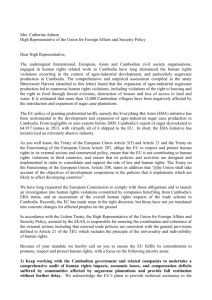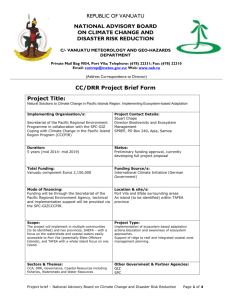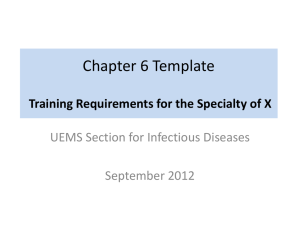fisheries biomes
advertisement
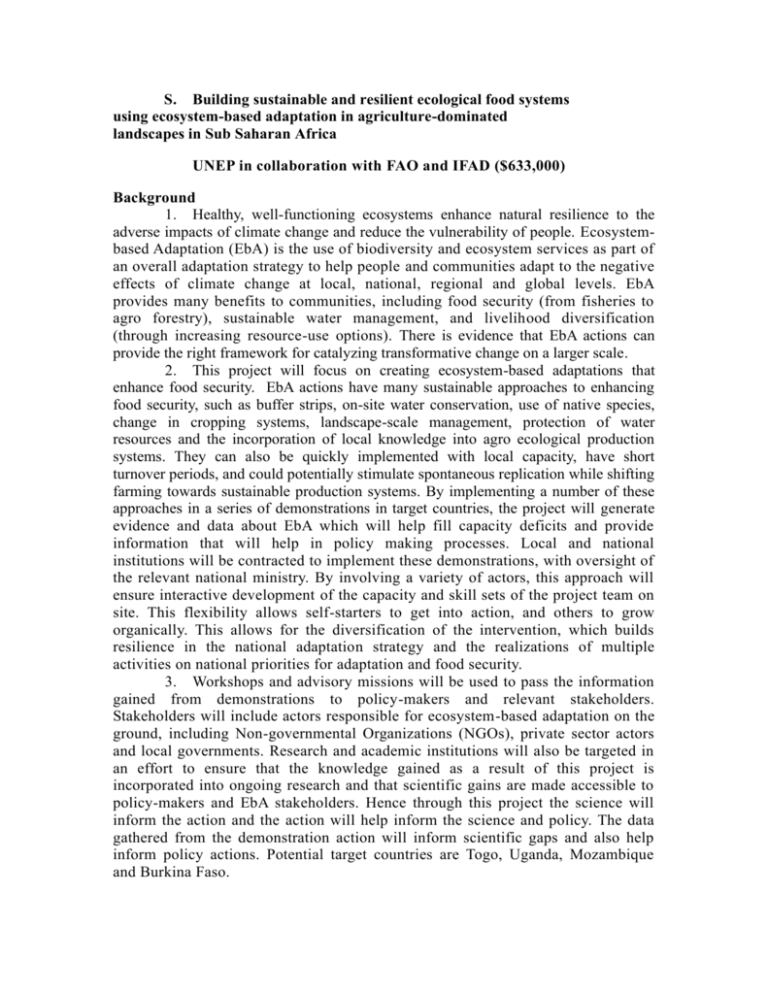
S. Building sustainable and resilient ecological food systems using ecosystem-based adaptation in agriculture-dominated landscapes in Sub Saharan Africa UNEP in collaboration with FAO and IFAD ($633,000) Background 1. Healthy, well-functioning ecosystems enhance natural resilience to the adverse impacts of climate change and reduce the vulnerability of people. Ecosystembased Adaptation (EbA) is the use of biodiversity and ecosystem services as part of an overall adaptation strategy to help people and communities adapt to the negative effects of climate change at local, national, regional and global levels. EbA provides many benefits to communities, including food security (from fisheries to agro forestry), sustainable water management, and livelihood diversification (through increasing resource-use options). There is evidence that EbA actions can provide the right framework for catalyzing transformative change on a larger scale. 2. This project will focus on creating ecosystem-based adaptations that enhance food security. EbA actions have many sustainable approaches to enhancing food security, such as buffer strips, on-site water conservation, use of native species, change in cropping systems, landscape-scale management, protection of water resources and the incorporation of local knowledge into agro ecological production systems. They can also be quickly implemented with local capacity, have short turnover periods, and could potentially stimulate spontaneous replication while shifting farming towards sustainable production systems. By implementing a number of these approaches in a series of demonstrations in target countries, the project will generate evidence and data about EbA which will help fill capacity deficits and provide information that will help in policy making processes. Local and national institutions will be contracted to implement these demonstrations, with oversight of the relevant national ministry. By involving a variety of actors, this approach will ensure interactive development of the capacity and skill sets of the project team on site. This flexibility allows self-starters to get into action, and others to grow organically. This allows for the diversification of the intervention, which builds resilience in the national adaptation strategy and the realizations of multiple activities on national priorities for adaptation and food security. 3. Workshops and advisory missions will be used to pass the information gained from demonstrations to policy-makers and relevant stakeholders. Stakeholders will include actors responsible for ecosystem-based adaptation on the ground, including Non-governmental Organizations (NGOs), private sector actors and local governments. Research and academic institutions will also be targeted in an effort to ensure that the knowledge gained as a result of this project is incorporated into ongoing research and that scientific gains are made accessible to policy-makers and EbA stakeholders. Hence through this project the science will inform the action and the action will help inform the science and policy. The data gathered from the demonstration action will inform scientific gaps and also help inform policy actions. Potential target countries are Togo, Uganda, Mozambique and Burkina Faso. 4. This project will build on successful experiences from UNEP-led EbA and food security projects, such as the use of agro-forestry, conservation agriculture and integrated nutrient management, and establishment of woodlots as land management practices in Uganda. The project will also build on UNEP’s long standing and valued reputation for providing global leadership, encouraging partnerships and convening the body of knowledge on the ecosystem management approach applied to cultivated land, forest, dry lands and mountain biomes. The project will be complemented by a robust upscaling strategy, which complements and builds upon other related actions such as the IFAD Adaptation for Smallholder Agriculture Programme (ASAP). UNEP expects that partners and donors will provide further in-kind and financial support to ongoing implementation. Objective of the Organization: To build ecological resilience of food systems and enhance food security through Ecosystem-based Adaptation (EbA) approaches in selected countries in Sub Saharan Africa Relationship to the strategic framework for the period 20142015 and the Millennium Development Goals: UNEP subprogramme 1 (Climate change), and subprogramme 3 (Ecosystem management); Millennium Development Goals 1 and 7. Summary budget (Thousands of United States dollars) General temporary assistance Consultants Travel Contractual services Operating expenses Workshops/training Total Expected accomplishments of the Secretariat Indicators of achievement 15.0 48.5 28.0 448.5 9.0 84.0 633.0 (EA1) Bridge the science-policy gap that currently exists through evidence gathered from demonstration of EbA approaches for food security (EA2) Strengthened government capacities to integrate EbA approaches into national food security policies and plans in four target countries (IA1.1) Number of national reports using EbA approaches (EA3) EBA for food security lessons learnt disseminated to a wider African audience (IA3.1) Four national governments incorporating EbA approaches into food security plans (IA2.1) Positive feedback on usefulness/effectiveness of EbA demonstrated approaches in enhancing food security in four target countries. This will be verified through interviews of stakeholders and national experts involved in project activities Main activities 5. The main activities of the project will include: (A1.1) Test EbA approaches and draw lessons from existing cases that contribute to increasing food productivity in four target countries; (A1.2) Integrate EbA into national and sub national food security policy plans; (A2.1) Organize advisory missions for national and sub national institutions to help governments in the four target countries to finalize EbA based national and sub national food security policy plans; (A2.2) Organize national workshops for food security and adaptation actors in the four target countries to draw lessons learnt and formulating them to inform policy development and planning; (A3.1) Organize regional workshop to disseminate the lessons learned to a wider audience in the countries and the region. Detailed budget (US dollars) General Temporary Assistance Temporary Assistance to assist in administrative matters and backstopping of limited substantive tasks during the implementation of the project, in support of activities A1.1 A1.2 and A2.2, A3 (20 work months x $750 per work month) = $15,000 15 000 Consultants International consultants For preparing and implementing workshops and participatory reviews of integrated food security adaptation practices in support of activities A1.2, A2.1, A2.2 (10 work months x $1,750 per months = $17,500) + (consultants’ travel = $10,000) = $27,500 National consultants For preparing and implementing workshops and participatory reviews of integrated food security adaptation in support of activities A1.2, A2.1, A2.2, A3.1 (12 work months x $1,250 per months = $$15,000) + (consultants’ travel = $6,000) = $21,000 48 500 Travel of staff United Nations staff members from implementing entity For organizing and participation in, training workshops; participatory reviews of integrated assessments and other relevant activities, in support of activities A1.1, A1.2, A2.1, A2.2 ($2,000 average mission cost x 12 missions) = $24,000 Staff from other United Nations entities For participation in national participatory reviews of integrated assessments and other relevant activities in support of activities A2.1, A2.2. Additional monitoring and evaluation will be provided by F ood and Agriculture Organization offices and relevant ministries in target countries as well as United Nations Environment Programme (UNEP) staff in the area for other projects ($2,000 average mission cost x 2 missions) = $4,000 28 000 Contractual Services Demonstrations and Pilot testing in four countries in support of activities A1.1 and A1.2, (Contractual services with a national institutions (local government, national governments) NGOs, Research institutions, and academic institutions. These institutions will demonstrate how Ecosystems Based Adaptation (EBA) for food security can be conducted with technical backstopping from UNEP. As you will see the examples of EBA illustrated in the background they need demonstration activities hence the reason for the 2/3 use of funds for the 4 countries (Demonstration of EBA for food security $112,125 per country x 4) = $448,500 448 500 Workshops National workshops Inception workshop for explaining what this project is all about and the approach to be used in its implementation, EBA for climate change and food security review workshop to review how the demonstration actions are conducted and the impacts they are having, experience sharing workshops to share the lessons learnt through this project and policy dialogues workshops for policy makers in each of the target countries to integrate EBA into national and sub national food security policy plans , 84 000 in support of activities A1.2, A2.1, A2.2 ($200 per participant x 25 participants x 2 workshops/country x 4 countries) = $40,000 Regional workshop One regional workshop to disseminate the lessons learned to a wider audience in the countries and the region in support of activity A3. 1 ($2.000 per participant x 22 participants) = $44,000 Operating Expenses Communication: in support of activity A1.1 Total . 9 000 633 000
